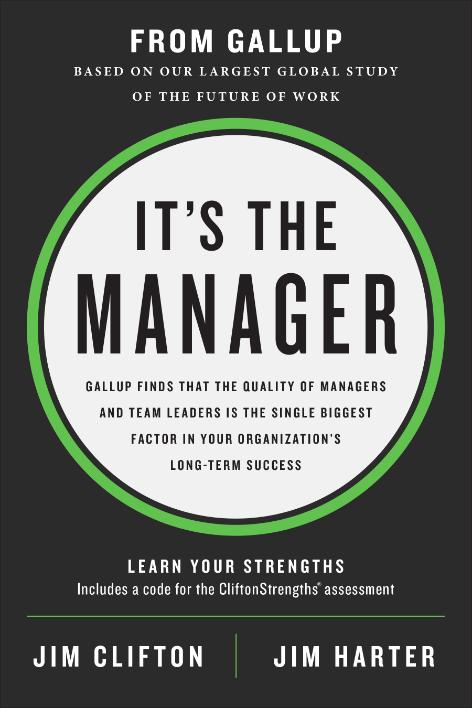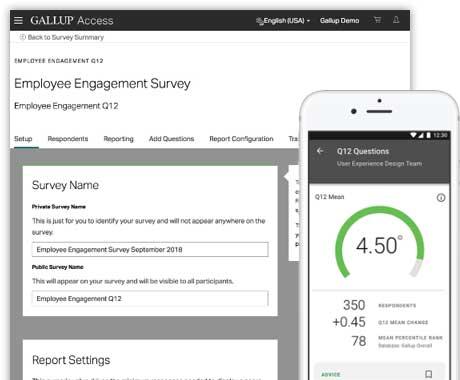Story Highlights
- 84% of U.S. employees work in an organization that is matrixed to some extent
- Engagement managers influence your employees' performance more than you realize
- There's hidden value in training your engagement managers to manage people
According to Gallup research:
- 87% of employees are performing below their capacity
- 84% of employees work in an organization that is matrixed to some extent
Eerily similar, those stats may be telling us there's something amiss in matrixed companies. They certainly show that the majority of the world's employees are underperforming.
But they don't tell us the one thing leaders need to know: how to improve performance in a matrixed company.
A significant solution is all too often overlooked, underleveraged and miscast. That solution? It's the manager.
According to Gallup research, managers account for 70% of the variation in employee engagement. And that matters because increased engagement translates to increased performance.
Gallup estimates that actively disengaged employees cost the U.S. $480 billion to $600 billion in lost productivity per year.
With that in mind, consider the role of engagement managers (or account managers, as they're sometimes called). On matrixed teams, they are primarily responsible for coordinating tasks and workflow.
But because people do the work, engagement managers are de facto people managers, too, having a profound impact on each team member's daily experience.
They're on the front line of providing what people need to perform at their best every day:
- They're the primary source of their team's daily expectations. Clear expectations are the first and most fundamental performance need.
- They are the source of materials, resources and information for their teams to do their jobs right.
- They're the only ones close enough to the day-to-day work to give meaningful, personal recognition to great performance on a regular basis.
- They have the relationships to truly show employees that someone cares and their opinions count.
- They know their employees' strengths and weaknesses better than anyone else.
Yes, engagement managers often get people management help from career coaches, mentors and HR, but among these players, engagement managers are closest to those actually doing the work. That's why they have the most direct influence over employee engagement.
So, engagement managers are people managers -- whether they know it or not, or whether they are held accountable for it or not. And they have extraordinary impact on performance.
Gallup research has shown that engagement drives earnings growth. Engaged workers perform, disengaged workers underperform. And as noted, 87% of workers are not engaged.
How to Increase Earnings Through Engagement Managers
The problem is, engagement managers in matrixed organizations usually aren't selected for their people management skills.
That is step one: Assess, promote and hire engagement managers on people management talent in addition to technical or project expertise.
Step two: Engagement managers are not trained for people management, and they're almost never taught how to develop other people's strengths on their teams. Engagement managers aren't taught these skills because their roles aren't created to encompass the responsibility of people management, especially in highly matrixed organizations. Invest in training engagement managers in people management skills that are proven to work.
Step three: Hold engagement managers accountable for people management outcomes. Establish a predictive measure of employee engagement and reward managers on the measure of their team's engagement with the project and the work.
These three simple talent management tools, specifically aimed at people management skills for the engagement manager, are a start to unlocking the hidden earnings potential that gets tied up in matrixed employees.
Engagement managers have the same opportunity to influence your employees' performance as formally designated people managers.
To start, matrixed company leaders need to understand what engagement managers actually do.
And then understand what engagement managers could do -- and the performance achievement they could attain -- if they were hired, trained and held accountable.
That's the tack consulting giant Accenture took. Accenture has been using Gallup's Q12 employee engagement index and CliftonStrengths to engineer its employee experience for years.
This commitment to people management and performance achievement analytics gave Accenture -- leaders, engagement managers (they're called Team Leads at Accenture) and individual contributors -- a deeper, better understanding of what Accenture employees are capable of, what they contribute and provided specific performance data.
Every company needs analytics to assess the performance of people managers. But most don't have the data, even though managers influence 70% of the variance in the team's engagement.
A talent strategy that makes too little of managers -- including engagement managers -- leaves too much on the table. Unfortunately, the data suggests underperformance is the norm in a matrixed structure.
The Value of Training Your Engagement Managers to Manage People
The goal, of course, is to help engagement managers recognize the earnings power they have through the engagement of their team -- and teach managers how to wield it.
That takes training, and it's well worth doing.
A recent analysis with 309 clients and more than 1.3 million employees shows investment in Gallup's corporate training courses substantially improves the already increased engagement rate that follows an employee engagement measure.
And engagement managers who capitalize on strengths to improve performance are more liable to attract top performers and retain them longer.
That has serious profit repercussions. Gallup Analytics show that managers trained to engage and coach employees realize a return of $1,812 per employee in the first year. That revenue is just sitting there, untouched, but accessible to an engagement manager with the right training.
To capture the earnings potential inherent in de facto managers -- and Gallup estimates the average earnings upside is 21% more for engaged teams -- engagement managers must recognize that they are people managers.
As 87% of employees are not fully engaged and 84% work in some form of a matrixed organization, the performance effect of the unseen, miscast, underleveraged potential in engagement managers could be extraordinary.
But to unleash it, they must be taught to see -- and apply -- their power to elicit better performance from their teams.
Gallup can help you develop and train every type of manager in your matrixed organization:
- Enroll your management team in our Boss to Coach Journey course.
- Sign up to receive exclusive insights from our new book, It's the Manager.
- Discover our survey and learning platform, Gallup Access, that helps HR leaders and managers improve their team's engagement and performance.





